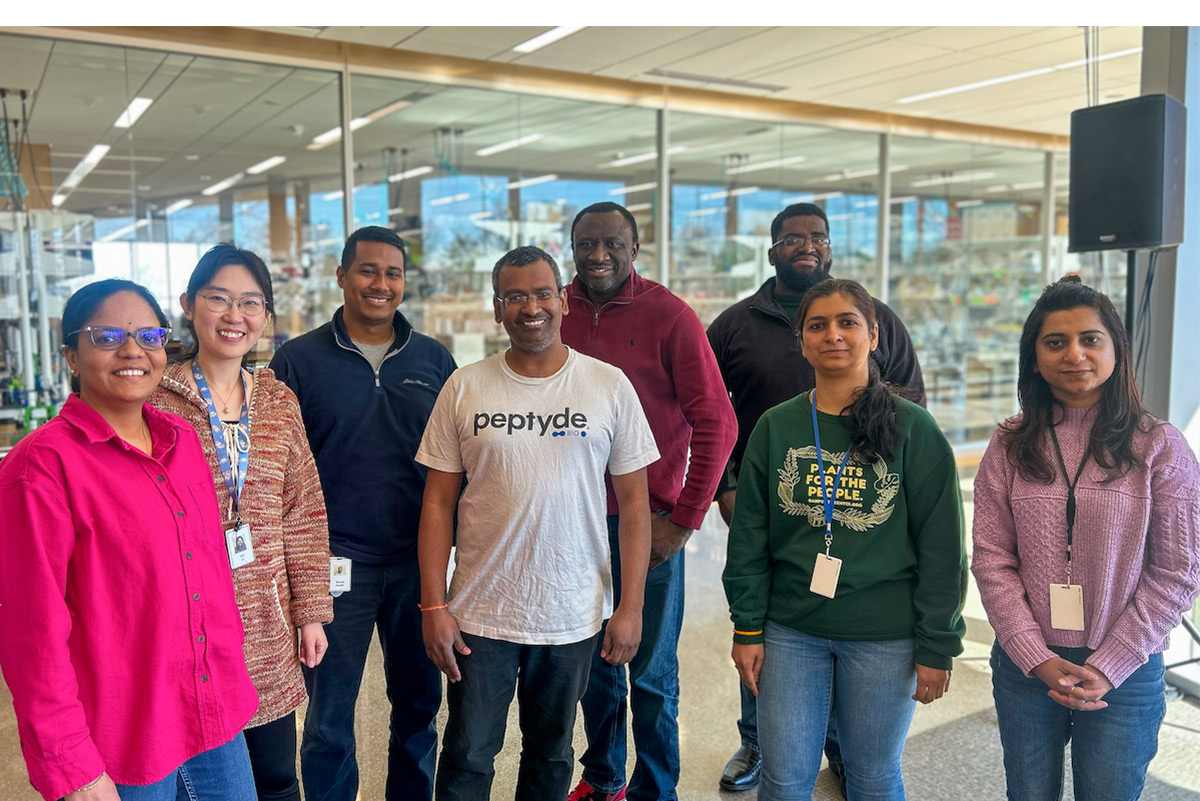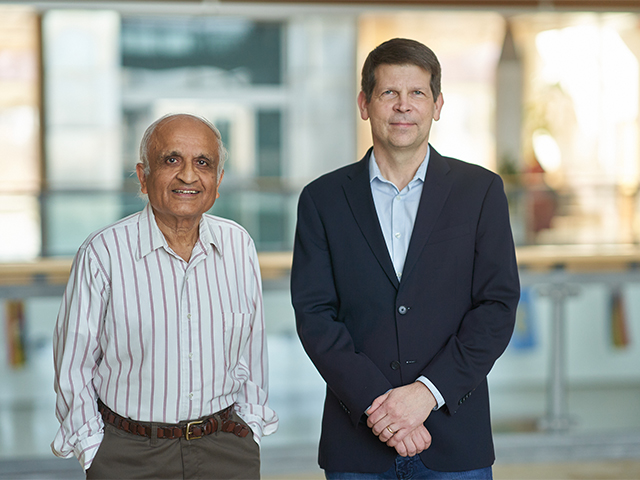From Activation to Acquisition: A Conversation with the Team Behind Peptyde Bio
In June of 2022, Peptyde Bio was launched by the Danforth Technology Company (DTC) to discover, design, and characterize modes-of-action in novel anti-microbial peptides (AMPs). These peptides are effective, environmentally friendly, and less expensive to develop than traditional fungicides, giving them the potential to complement or even replace their chemical counterparts.
In addition to the company founders, Principal Investigators Dilip Shah, PhD and Kirk Czymmek, PhD, nine Center scientists conducted research as part of a sponsored research project funded by Peptyde Bio. After a successful liftoff, including several new patent filings, Peptyde Bio was acquired in December 2023 by Invaio Sciences, a global company focused on developing nature-positive agriculture.
The scientific team continues to work under the direction of Czymmek and a sponsored research agreement with Invaio during the transition phase. As they celebrate the company’s acquisition and look ahead to the future, the team behind Peptyde Bio sat down with us to discuss what it is like to be a part of the creation of a startup and experience a successful exit.

From left: Research Associate Harini Gottumukkula; Research Scientist Hui Li; Research Scientist Bikash Poudel; Scientist and Project Manager Siva Velivelli; Research Scientist Arnaud Djami Tchatchou; Data Scientist II Seth Polydore; Research Associate Rupali Shinde; and Research Scientist Meenakshi Tetorya. (Not pictured: Structural Biology Senior Scientist Saurav Misra)
What inspired the initial launch of Peptyde Bio?
Scientist and Project Manager Siva Velivelli, PhD: The inspiration for Peptyde Bio was based on 20 years of research by Dilip and his lab, and their work to leverage AMPs to combat fungal disease in plants, with the ultimate goal of decreasing crop losses and enhancing food security.
With Kirk’s experience in industry and expertise in advanced imaging of plant and fungal interactions and cell biology, we knew we could add an important dimension to rapidly screening peptides’ effects on the pathogens and modes-of-action studies. Some of this work culminated in a high-profile PNAS publication which accelerated the joint collaboration.
Structural Biology Senior Scientist Saurav Misra, PhD: While it started as a scientific collaboration, Kirk and Dilip both had an entrepreneurial drive and experience in industry. They got to chatting with Tom Laurita, CEO of the DTC, and came to the consensus that the opportunity to create a successful startup was promising.

Principal Investigators, Dilip Shah, associate member and Kirk Czymmek, director of the Advanced Bioimaging Laboratory, whose collaborative research formed the foundation of Peptyde Bio.
Was acquisition a goal from the outset?
Siva: It was a goal to commercialize the research from the very beginning, but acquisition was not a short-term goal. We are very glad that it happened so quickly. It is a significant milestone that reflects the value and potential of our research at the Danforth Center and the support of the DTC.
Saurav: Publishing papers and filing patents early on helped lay the groundwork for the acquisition. Combine that foundation with the supportive environment of the Danforth Center, the DTC, the 39 North community, and the St. Louis agtech/biotech community as a whole, along with the funding and support from the Wells Fargo Innovation Incubator (IN2), we were set up for success.
How did the team contribute to the success of Peptyde Bio?
Research Associate Harini Gottumukkula, PhD: I can confidently say that everyone on this team believes in collective success, not individual success. You must fill in gaps when there is a critical need. And everyone is ready to help.
Research Scientist Arnaud Djami Tchatchou, PhD: In the startup world, you have to be flexible. You can’t get stuck on just one thing. We are working together on something that won’t necessarily end with a publication. We wanted the research to translate beyond the lab to the field and to farmers.
Research Scientist Hui Li, PhD: Having to rely on each other made it a learning experience too. We all have our specialties, but through this process we get to share knowledge and learn from each other. I am not a plant pathologist, but I have learned so much about plant pathology from Arnaud.
Peptyde Bio team members Harini, Siva, Hui, and Arnaud work in the Danforth Center Peptyde Bio lab space.
What were some of the challenges you faced throughout this experience?
Saurav: For those of us coming from an academic background, there’s a real mindset switch that’s required. Larger team dynamics are very different from what you’re used to as a postdoc. Priorities are different, so there’s a reprogramming of what your psychological reward is. It’s not just to do good science, build your resume, publish, and land positions. You have to learn to make yourself happy and satisfied with different kinds of achievements.
Communication is an important skill that many of us didn’t learn as part of our scientific/academic training process. In the startup world, you must know how to frame and communicate your goals if you want your company to move forward.
Research Scientist Meenakshi Tetorya, PhD: Agreed! When I first joined the team in 2020, I thought I was just going to be here for three months as part of the proof-of-concept efforts. My role was to purify and characterize multiple peptides for evaluation of their clinical potential in an NIH supported project and screening against a broad range of other fungal and bacterial pathogens. I was more familiar with publishing papers as a career goal and wasn’t sure about the world of startups. But being a part of building the foundation of the company gave me a lot of exposure. I saw how valuable and exciting this kind of research can be.
Hui: The scale that you are working on is a huge difference. It is ten times the scale of your average research, so we had to figure out new techniques to approach that larger scale. We kept finding improved approaches and kept building on them as we went.
Research Associate Harini Gottumukkula, PhD: Personally, I never thought I would be doing so many things. On any given day, I would be working on 4–5 tasks, all from completely different “genres,” so to speak. I enjoy it—there is so much room to explore.
Research Associate Rupali Shinde, PhD: Any startup inherently has its challenges, but you learn a lot. We had challenges with infrastructure, but the Danforth Center leadership team was very helpful with that. I came into this without any background in peptides and learned a lot. It has been a great experience, and I’m very happy that we are where we are now.
What has been the most rewarding part of this project so far?
Data Scientist Seth Polydore, PhD: For me, the most rewarding thing was seeing our research acquired. It was gratifying to know that after the meetings with the people at Invaio Sciences, they liked what they saw and believed in what we are doing.
Rupali: The acquisition helps our work take the next step. It means that our research can go beyond the lab and be applied in the field faster.
Bikash: As scientists, we try to publish papers and bring innovative ideas into the world, but that’s just the tip of the iceberg. There are thousands of published papers out there, but how many of those translate to a product that farmers and consumers want? Our work is among the research that does reach beyond publication, and that is a great achievement.
What are your hopes for the project going forward?
Siva: Our plan for this year is to test our peptides in the real world by getting them into the field. We want to see the product in the market.
Saurav:, I’m hoping we can make a quantum leap in our own development of our peptides. I can’t help thinking there might be some breakthroughs that could put us at a real advantage. We would like to be leaders in the field.
Hui: We want to bring peptides to an application, and to see our work compete with traditional pesticides.
Harini: We are going to replace chemical fungicides. It can be achieved. We have seen progress in the lab, and personally, I feel it is possible. And that is inspiring.